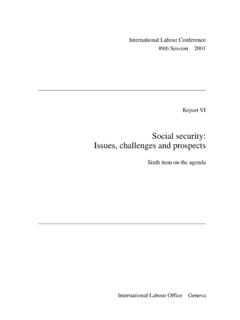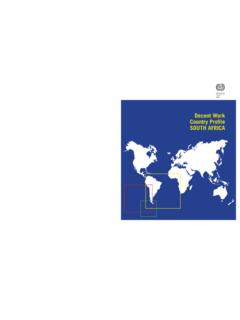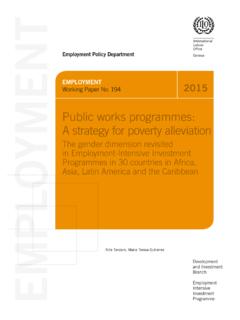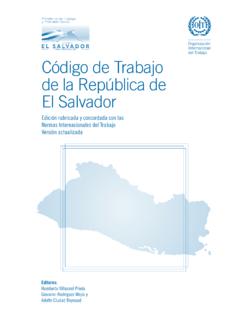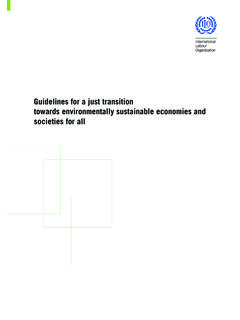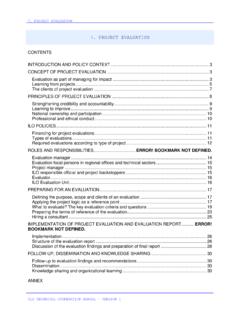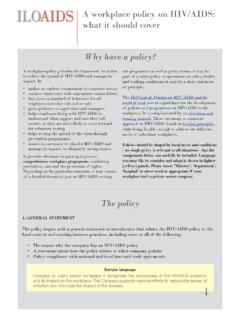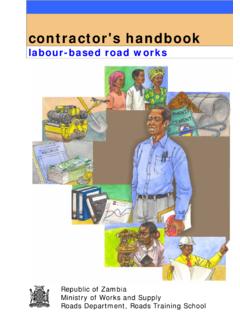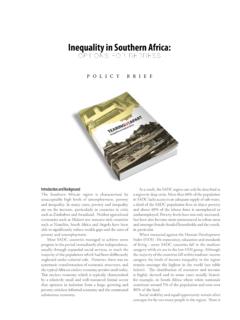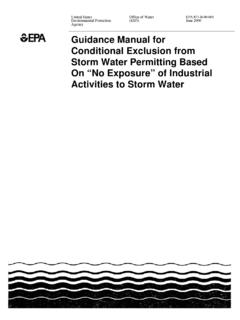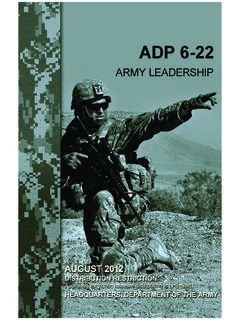Transcription of PROJECT DESIGN - ilo.org
1 PROJECT . DESIGN . manual . A STEP-BY-STEP TOOL. to Support the Development of COOPERATIVES and Other Forms of SELF-HELP ORGANIZATIONS. The Cooperative Facility for Africa (COOP AFRICA) is a regional technical cooperation programme of the ILO that contributes to the achievement of the Millennium Development Goals and the Decent Work Agenda in Africa by promoting self-help initiatives, mutual assistance in communities and cross-border exchanges through the cooperative approach. COOP AFRICA contributes to improving the governance, efficiency and performance of primary coopera- tives, other social economy organizations and their higher-level structures in order to strengthen their capacity to access markets, create jobs, generate income, reduce poverty, provide social protection and give their members a voice and representation in society. COOP AFRICA 's approach consists of: assisting stakeholders to establish a legal and policy environment conducive to the development of cooperatives; providing support services through Centres of Compe- tence ; promoting effective co-ordinating structures ( unions and federations); and establishing and maintaining challenge funds for services', innovation' and training'.
2 These funds are accessible through a competitive demand-driven mechanism and a transparent selection of the best proposals. COOP AFRICA and its network of Centres of Competence provide different types of services: policy and legal advice; studies and publications; training and education; support for field projects; development or adaptation of teaching and methodological material; networking; advocacy; promotion of innovative cooperative ventures; and others. COOP AFRICA is located in the ILO Country Office for the United Republic of Tanzania, Kenya, Rwanda and Uganda and is part of the Cooperative Programme (EMP/COOP) of the Job Creation and Enterprise De- velopment Department of the ILO. The programme works in partnership with the International Coopera- tive Alliance (ICA), the UK Cooperative College, the Committee for the Promotion and Advancement of Cooperatives (COPAC), the International Trade Union Confederation (ITUC-Africa), the International Or- ganization of Employers (IOE) and the African Union Secretariat.
3 COOP AFRICA is a multi-donor programme, primarily supported by the UK Department for International Development (DfID). It also receives support from the Swedish International Development Cooperation Agency (SIDA), the Government of Finland, the Arab Gulf Programme for United Nations Development Organizations (AGFUND) and the German Cooperative and Raiffeisen Confederation (DGRV). ILO Country Office the United Republic International Labour Office of Tanzania, Kenya, Rwanda and Uganda Cooperative Programme (EMP/COOP). COOP AFRICA 4, route des Morillons Kazi House, Maktaba Street 1211 Geneva 22. Box 9212 Switzerland Dar es Salaam Tel: + 41 22 799 7445. United Republic of Tanzania Fax: +41 22 799 8572. Tel: +255 22 212 6821/24/26 E-mail: Fax: +255 22 212 6627 E-mail: II. PROJECT DESIGN manual A Step-by-Step Tool to Support the Development of Cooperatives and Other Forms of Self-Help Organization 2010. COOP AFRICA. Cooperative Facility for Africa ILO Country Office for the United Republic of Tanzania, Kenya, Rwanda and Uganda Cooperative Programme (EMP/COOP).
4 Job Creation and Enterprise Development Department (EMP/ENT). Employment Sector III. Copyright International Labour Organization 2010. First published December 2010. Publications of the International Labour Office enjoy copyright under Protocol 2 of the Universal Copyright Convention. Nevertheless, short excerpts from them may be reproduced without authorization, on condition that the source is indicated. For rights of reproduction or translation, application should be made to the ILO Publications Bureau (Rights and Permissions), International Labour Office, CH-1211 Geneva 22, Switzerland, or by email: The International Labour Office welcomes such applications. Libraries, institutions and other users registered with reproduction rights organizations, may make photocopies in accordance with the licences issued to them for this purpose. ISBN 978-92-2-124168-3 (web pdf). ILO Cataloguing in Publication Data The designations employed in ILO publications, which are in conformity with United Nations practice, and the presentation of material therein do not imply the expression of any opinion whatsoever on the part of the International Labour Office concerning the legal status of any country, area or territory or of its authorities, or concerning the delimitation of its frontiers.
5 The responsibility for opinions expressed in signed articles, studies and other contributions rests solely with their authors, and publication does not constitute an endorsement by the ILO of the opinions expressed in them. References to companies or to commercial processes or products do not imply approval by the International Labour Office, while failure to refer to firms or commercial processes or products does not imply disapproval. Reference to names of firms and commercial products and processes does not imply their endorsement by the International Labour Office, and any failure to mention a particular firm, commercial product or process is not a sign of disapproval. ILO publications can be obtained through major booksellers or ILO local offices in many countries, or direct from ILO Publications, International Labour Office, CH-1211 Geneva 22, Switzerland. Catalogues or lists of new publications are available free of charge from the above address, or by email: Visit our website: IV.
6 Acknowledgements This manual is the result of collaboration between ILO Cooperative Facility for Africa (COOP AFRICA). and the International Training Centre of the ILO through its Enterprise, Microfinance and Local Development Programme and the Sustainable Development and Governance Cluster. Authors: Nieves Thomet, Alice Vozza Technical editing and coordination: Carlien van Empel Language editing: Bryan Murphy Graphic DESIGN : Marco Giacone Griva The authors gratefully acknowledge the use of the ILO STEP/CIARIS material for designing projects to fight against social exclusion 1, the ILO/PARDEV Technical Cooperation manual and e-learning modules 2 and the support of COOP AFRICA in producing this manual on PROJECT DESIGN for cooperative support organizations, whose objective is to promote the development of cooperatives and other forms of self-help organization through the identification, formulation and planning of sustainable projects that are appropriate to the needs of the target groups and adequate to potential donors' quality standard requirements.
7 In particular, comments, suggestions and feedback provided by the following people and institutions are gratefully acknowledged: ILO/COOP AFRICA: Sandrine Lo Iacono, Eva Majurin, Guy Tchami, Lorena Trejos, Carlien van Empel and Philippe Vanhuynegem ILO Geneva: Tita Prada De Mesa and Craig Russon ITC/ILO Turin: Martin Gasser, Johanne Lortie and Guillaume Mercier Moshi University College of Co-operative and Business Studies, Tanzania: Legnard Ngailo Ambo University Ethiopia: Bekele Tassew Cooperative College of Swaziland: Charles Mgezeni Hlatshwako Rwanda Cooperative Agency: Vincent Rutaremara Chris Ndzimandze, consultant Jo o De Azevedo, consultant 1. 2. V. TABLE OF CONTENTS. List of Getting started: introducing the PROJECT DESIGN is a PROJECT ?..12. ii. How is a PROJECT designed?..16. of the case Step 1 PROJECT Conducting a stakeholder analysis and selecting your target Analysing the Analysing the Selecting your Step 2 PROJECT Building your logical Setting the objectives, outputs and activities: first Setting up the indicators and means of verification: second and third Setting up the key assumptions: fourth Step 3 Implementation The work breakdown Responsibility Calendar of Resource plan and Step 4 Planning of monitoring and Monitoring Planning the Annex 1 - Example of a PROJECT document template: The CoopAFRICA Challenge Annex 2 - Grant possibilities and VI.
8 LIST OF ABBREVIATIONS. AECF Africa Enterprise Challenge Fund AGRA Alliance for a Green Revolution in Africa AusAID Australian Agency for International Development BiD Business in Development CEDAW Convention on the Elimination of all Forms of Discrimination against Women CIARIS Learning and resources centre on social inclusion (ILO). COOP AFRICA Cooperative Facility for Africa (ILO). DAC Development Assistance Committee (OECD). DFID Department For International Development, UK. DWCP Decent Work Country Programme EC European Commission EU European Union EMP/COOP Cooperative and Rural Programme of the ILO. EMP/ENT Job Creation and Enterprise Development Department of the ILO. GTZ German Technical Cooperation ICA International Cooperative Alliance IFAD International Fund for Agricultural Development IFRC International Federation of Red Cross and Red Crescent Societies ILO International Labour Office / Organization ITC/ILO International Training Centre of the ILO.
9 ITUC International Trade Union Confederation Logframe Logical framework MDGs Millennium Development Goals MUCCoBS Moshi University College of Co-operative and Business Studies NAGs National Advisory Groups NGOs Non-Governmental Organizations PARDEV Department of Partnerships and Development Cooperation of the ILO. OECD Organisation of Economic Cooperation and Development PCM PROJECT Cycle Management PRSP Poverty Reduction Strategy Paper RBM Results-Based Management SACCO Saving and Credit Cooperative SIDA Swedish International Development Cooperation Agency SMART Specific, Measurable, Achievable and Agreed-upon, Realistic and Time-bound STEP Strategies and Tools against social Exclusion and Poverty (ILO). SWOT Strength, Weakness, Opportunities and Threats ToR Terms of Reference UK United Kingdom UN United Nations USAID United States Agency for International Development YEN Youth Employment Network (ILO, UN, World Bank). YES JUMP Youth Employment Support Jobs for the Unemployed and Marginalized Young People (ILO).
10 VII. Introduction In 2009 ILO/COOP AFRICA and the . International Training Centre of the ILO . (ITC/ILO) started a new col- laboration to enhance the PROJECT cycle management (PCM) capacity of cooperatives and other self-help organizations. In order to help improve the quality of PROJECT proposals and provide assistance in their implementation, a series of activities were launched within the framework of the second call for the ILO/COOP AFRICA Chal- lenge Fund. Among these were: A face-to-face training workshop, held at Moshi University College of Cooperative and Business Studies (MUCCoBS) in Tanzania in March 2009. Working with representatives of the COOP AFRICA. National Advisory Groups, the workshop covered generic PCM concepts based on the draft PROJECT DESIGN tool developed by COOP AFRICA and the Cooperative College of the United Kingdom combined with ITC/ILO PCM materials and expertise. Revising Challenge Fund guidelines and application form together with the development of a checklist to assess the technical soundness of PROJECT proposals.
